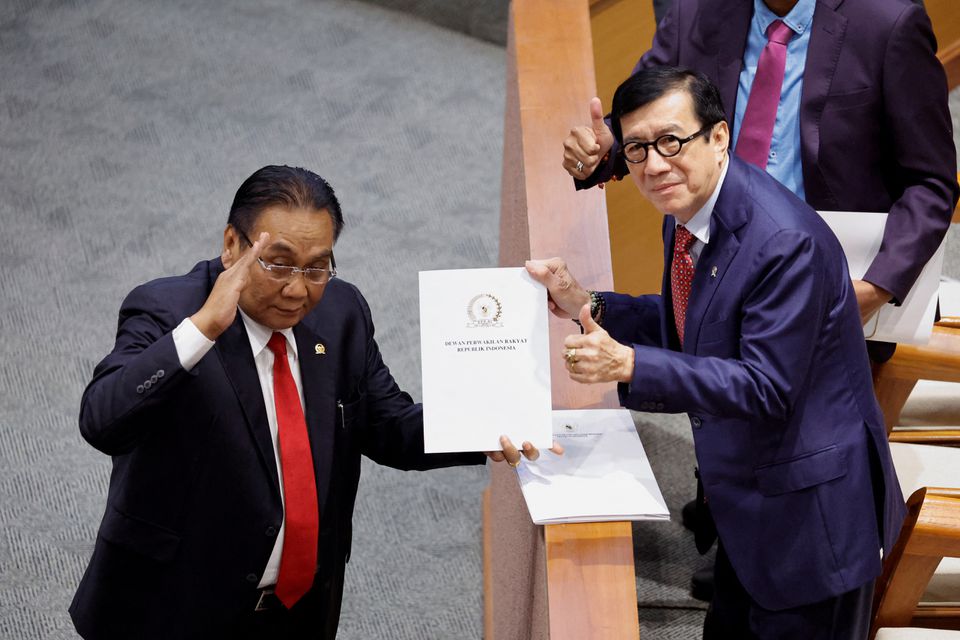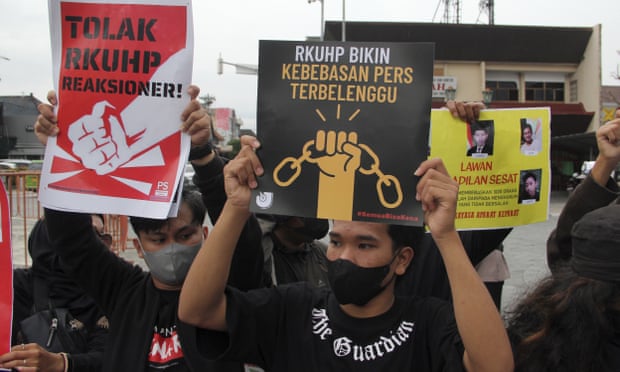- Culture
- 07 Dec 22
Indonesia reforms criminal code making sex outside of marriage illegal, along with other shocking clauses

Human rights activists have spoken out against the new code - which criminalises sex outside of marriage, promotion of contraception, insulting the President, and more. LGBTQ+ activists also worry that the community will be targeted unfairly based on the country's refusal to recognise same-sex marriage.
Indonesia, the world's third-largest democracy, has overhauled the country's criminal code to outlaw sex outside of marriage and roll-back freedom of speech.
This new legislation, which was passed by parliament with support from all political parties, has caused uproar - not only with rights activists but in the country's tourism sector, which is intrinsic to Indonesia's economy.
Australian newspapers have labelled this new draconian legislation the "Bali bonk ban," as it will apply to both nationals and tourists travelling into the country.
The deputy chief of Indonesia’s tourism industry board, Maulana Yusran, has said the code was “totally counterproductive” and has unfortunately been introduced just as the country tries to recover from the pandemic. “We deeply regret the government have closed their eyes,” Yusran added.
Human rights groups have long protested against the code, which also outlaws unsanctioned public demonstrations, and bars criticism of the president.
 Yasonna Laoly, Indonesian Minister of Law and Human Rights, receives the new criminal code report from Bambang Wuryanto, head of the parliamentary commission overseeing the revision. Photo: REUTERS/Willy Kurniawan
Yasonna Laoly, Indonesian Minister of Law and Human Rights, receives the new criminal code report from Bambang Wuryanto, head of the parliamentary commission overseeing the revision. Photo: REUTERS/Willy Kurniawan“What we’re witnessing is a significant blow to Indonesia’s hard-won progress in protecting human rights and fundamental freedoms over more than two decades," Amnesty International Indonesia Executive Director, Usman Hamid, said. "The fact that the Indonesian government and the House of Representatives agreed to pass a penal code that effectively stamps out many human rights is appalling.”
Hamid added: “This contentious and overreaching new Criminal Code will only do more harm to an already shrinking civic space in Indonesia. The reinstatement of provisions banning insults to the president and vice president, the sitting government as well as state institutions will further entrench obstacles to freedom of speech while criminalising legitimate and peaceful dissent. The ban on unsanctioned public demonstrations could unduly restrict the right to peaceful assembly.
“The new Criminal Code practically gives those in power authority to suppress opinions that they don't like through selective enforcement. This can cement a climate of fear that stifles peaceful criticism and freedom of assembly.”
The director continues, turning to international law: “Outlawing sex outside marriage is a violation to the right to privacy protected under international law. Such ‘morality’ provisions could even potentially be misused to criminalise victims of sexual assault or to target members of the LGBTI community. Consensual sexual relationships should not be treated as a criminal offence or a violation of ‘morality’.
“This Criminal Code should have never been passed in the first place and is a dramatic rollback of human rights progress in Indonesia. Instead of destroying hard-won rights victories, the Indonesian government and the House of Representatives should live up to their human rights commitments for the benefit of all Indonesians.”
Some human rights groups have said this move highlights a growing shift towards the tighter imposition of Islamic control in the majority-Muslim country, which has long been hailed for its secularism.
A sad day for Indonesia. This new 'anti-colonial' criminal code is a setback to democracy and will create new forms of repression. In criminalising sex and cohabitation outside marriage (just one of the affected clauses), it assumes a normative and narrow understanding of family. https://t.co/TakpT4OOcm
— Victoria Kumala Sakti (@VictoriaSakti) December 6, 2022
However, legislators see the vote as a big step in the effort to replace Dutch colonial laws that have long-remained a deep part of Indonesia’s judicial system.
The minister of law and human rights, Yasonna Laoly, told parliament: “We have tried our best to accommodate the important issues and different opinions which were debated. However, it is time for us to make a historical decision on the penal code amendment and to leave the colonial criminal code we inherited behind.”
Under this new legislation sex outside of marriage will be punishable by a year in prison, with cohabitation carrying a six month sentence. According to supporters of the law, charges can only be brought based on police reports filed by a spouse, parents or children.
However, Taufik Basari, a NasDem party legislator, has said if a tourist visiting the country were to have consensual sex with a national and it was reported by the Indonesian person's parent or child, that tourist could be liable for arrest.
“I know it will impact tourism," the legislator admits, "which is why we should explain to the public that reports to police should be limited to what the family feels is really important. As a parliamentarian, I will try to find more limitations for the implementation of these articles.”
A senior Indonesian researcher at Human Rights Watch, Andreas Harsono, has said the code could be selectively enforced due to its impracticality, citing “millions” of cohabiting and unmarried couples in Indonesia.
Further, there are significant fears this new code could severely impact the LGBTQ+ community in Indonesia - a country where gay marriage is not acknowledged.
Amendments to Indonesian criminal code could adversely impact women and girls, minorities and LGBTIQ+ persons, as well as freedom of expression. Important to safeguard #Indonesia’s international human rights obligations and #GlobalGoals commitments.
— UN Human Rights (@UNHumanRights) December 6, 2022
Speaking about the oppressive news coming from Indonesia, Hot Press editor, Niall Stokes, said: "It is really grim to see a country like Indonesia heading in precisely the opposite direction to Ireland on issues to do with sex and sexuality."
Under this code, the promotion of contraception is also illegal. The legislation maintains abortion is a crime - however, it adds exceptions whereby women with life-threatening medical conditions or who have been raped can access abortions. This is provided that the foetus is under 12 weeks, in line with what is already regulated.
"Ireland didn’t ban sex outside marriage legally – but in denying access to contraception to people who were not married, in effect until the 1990s, successive governments here exercised policies that were tantamount to a ban on sex outside marriage," Niall adds.
"In Indonesia, right now, this is all about the tighter imposition of Islamic control – but, in truth, a ban of this kind is also putting the existing moral diktats of the Roman Catholic Church into law. The fact that sex outside marriage is considered a ’sin’ – whatever that is – says it all, really."
This new code also restores a ban on insulting a sitting president and/or vice-president, state institutions and national ideology. This idea was formed in an old law which Indonesia's top courts abolished in 2006. Insults to a sitting president must be reported by that president, carrying up to a three year prison sentence.
Chair of the Alliance of Independent Journalists (AJI) Indonesia, Sasmito Madrim, informed that the code stifled the "basic work" of reporting. The chair highlighted 17 "problematic articles" which criminalise "spreading communism," defamation of the dead, criticism of public leaders, and so on.
“The new code has the potential to send journalists to prison," Madrim added.
 Photograph: Slamet Riyadi/AP
Photograph: Slamet Riyadi/AP"Watching what’s going on in Indonesia is a sad reminder that the price of freedom is eternal vigilance," Stokes further commented. "Here in Ireland or elsewhere, we cannot afford to switch off or become complacent even for a minute. As with the overturning of Roe .v. Wade in the United States of America, there are forces out there, in countries where there is a tradition of Christianity of one kind or another, that want to turn the clock back to a time when religion was the dominant force in shaping legislation and in shaping society.
"Those same forces exist here. We need to be sure that we do not offer them any form of encouragement. By the same token, Ireland has a role to play in International affairs, promoting at every turn, the freedom of women from patriarchal dominance. From being denied education. From being prevented from working – which happened to married women in Ireland in the relatively recent past.
"We still have some way to go here in Ireland to ensure the complete separation of Church and State. That means taking control of education out of the hands of religious orders. And the same in relation to hospitals and everything to do with health. People should be completely free to believe or otherwise in any deity of their choice. But the State should facilitate that on an equal basis by ensuring that religion is – and remains – a private matter."
In 2019 a draft of the code was proposed to be passed, but the process was delayed due to public uproar, with tens of thousands protesting nationwide. This time round, rallies were more subdue, with merely a dozen protesters gathering and holding banners in downtown Jakarta.
RELATED

- Opinion
- 21 Dec 24
Women's Rights in 2024: The Ongoing Battle Against Misogyny

- Film And TV
- 17 Jul 24
Ani DiFranco: "None of this can be imagined or believed. It’s just somehow happening"
RELATED

- Culture
- 24 May 23
Repeal the 8th: Five years on, abortion access remains obstructed

- Film And TV
- 02 May 23





